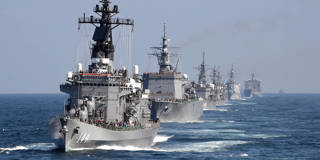 Toru Yamanaka/AFP via Getty Images
Toru Yamanaka/AFP via Getty Images
日本的威慑会是什么样
伦敦—日本对俄罗斯入侵乌克兰以及不久前俄罗斯和中国宣布的“战略伙伴关系”反应果断,令人印象深刻。 日本政府关于在未来五年内将国家国防预算增加近一倍的提案表明了政治现实主义和实际决心。 现在的关键问题是如何花这笔钱。
https://prosyn.org/CENUEZSzh
To continue reading, register now. It’s free!
Register Now
Already have an account?
Log in



伦敦—日本对俄罗斯入侵乌克兰以及不久前俄罗斯和中国宣布的“战略伙伴关系”反应果断,令人印象深刻。 日本政府关于在未来五年内将国家国防预算增加近一倍的提案表明了政治现实主义和实际决心。 现在的关键问题是如何花这笔钱。